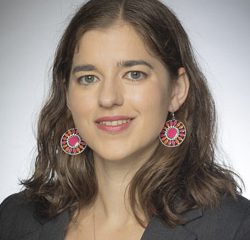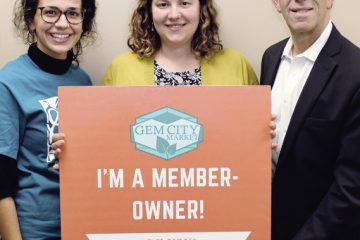All who are hungry need to eat

By Rabbi Tina Sobo, Temple Israel
We are taught as Jews that we are to “walk in God’s ways (Deut 26:17),” which among interpretations in the Talmud means to do as God does: clothe the naked as God did for Adam and Eve, visit the sick as God did for Abraham, comfort mourners as God did for Isaac, and bury the deceased as God did for Moses (Sotah 14a).
There are many other examples we can draw on, including feeding the hungry.
For 40 years as the Israelites wandered the desert after leaving Egypt, God fed us with manna — everyone: Moses, Aaron, Miriam, the heads of the tribes, the priests, down to the wood chopper and water drawer. Everyone had food for their needs. We must aspire to fulfill the divine within us to help others meet those needs.
Has there been a time over the last 12 months when you did not have adequate nutritious food for yourself or your family, when you did not know what your next meal might be?
Over my two years in Dayton, I’ve come to love so much of what this city has to offer. One thing I don’t love is that while 13 percent of Americans in 2016 experienced food hardship or food insecurity (not having access to affordable and nutritious food), 15.1 percent in Ohio did, and 17.5 percent in Montgomery County did, including 22 percent of our children.
In 2014-15, Dayton was the metropolitan area with the second highest rate of food insecurity in the nation.
To me, this is a huge problem. This is our problem as a Jewish community — both because our fellow Jews are hungry (food insecurity doesn’t discriminate), and because we are responsible to our neighbors as humans.
The issue is not about the amount of food we produce as a society. The issue is one of distribution. If all the food we produce were distributed evenly, we would have enough grain alone to feed every human 3,200 calories a day (well beyond the average need of 2,000 calories), and that doesn’t account for meat, dairy, vegetables, fruits, etc.
There are areas called “food deserts” — places that do not have an accessible full-service grocery store. We need accessible, affordable, nutritious food.
There are those in Dayton and across our country who use money they would otherwise spend to get sufficient food just to get to the grocery store in the first place.
In a food desert, food may be accessible but not affordable or nutritious. Or it may be affordable and/or nutritious but not easily accessible.
Each grocery trip is a calculated decision of what you need, and how and where you are going to get it with the resources you have.
You have to ask yourself: Is it worth sacrificing some food money to get to a place that has more nutritious food? How will you transport it back? How will you store it (and if you are experiencing homelessness, that’s a whole different question). What food items are SNAP-eligible and which ones aren’t? How do I balance the need for nutritious food with affordable and accessible food (apples or Ramen)? Are there categories of foods that I can get from other sources — available to those on government assistance, school lunch programs that require balanced meals, soup kitchens, etc.?
West Dayton is a food desert. There is no full-service grocery store in the neighborhood. The closest grocery store to where ALDI (the last one in the neighborhood) was, is four miles away.
In Judaism, it does not matter who is hungry. All who are hungry need to eat. All who are hungry are within our responsibility.
The food desert in West Dayton is our problem as Daytonians, as Jews, as humans. We are obligated to care. We are obligated to do something about it.
So what can we do about it? One answer is Gem City Market. Many of West Dayton’s residents receive government and/or non-profit financial assistance. But they don’t have the ability to buy the food they need or buy it at a reasonable price.
It’s one thing to pay convenience store prices when you run out of eggs in the middle of preparing a meal; it is another to have to buy all your groceries at that price day in and day out. Two major grocery stores have failed to make enough of a profit to stay open in West Dayton.
If you were a grocery store chain, would you want to buy either location and move in? Yet our Daytonians need food — that’s a fact of life. For West Dayton, there is no option.
Gem City Market is trying something new to our area. It is a cooperative grocery store, meaning it will be community and worker owned, not corporate. It will provide “affordable, quality, kitchen staples, including well-stocked fresh produce and meat departments, as well as specialty, local and organic products.”
It will feature a hybrid pricing strategy, meaning basics will be priced for those on a limited food budget, while specialty items will be priced for those with more disposable income, and will include 15-20 percent local products (produce, meat, dairy, bakery).
Between jobs at the grocery store and helping support local food producers, this will also mean more employment opportunities in the area.
 Supporting a co-op model like this doesn’t just feed someone for a meal or a day, but allows those in West Dayton to begin to become self-sufficient in obtaining accessible, affordable, nutritious foods.
Supporting a co-op model like this doesn’t just feed someone for a meal or a day, but allows those in West Dayton to begin to become self-sufficient in obtaining accessible, affordable, nutritious foods.
The community has a stake in the store, meaning if it begins to struggle, the community can support it through that struggle, rather than making a financial decision to close, knowingly leaving an entire neighborhood without access to proper food.
Gem City Market has the potential not only to bring affordable, accessible, nutritious food into the food desert of West Dayton, but to do so in a way that will bring more than just food to the neighborhood.
So what can you do? You can financially support this endeavor. There are member-owner shares and other ways to support the store.
But even if you can’t afford to support the endeavor financially, you can talk about it, promote it, like it on Facebook, shop there when it gets off the ground.
We can support other organizations that are working to bring or provide affordable, accessible food to others.
We can continue to donate food items — new or even leftovers — to House of Bread and other pantries for those in need.
Rabbi Lord Jonathan Sacks of England has said that “One of (my) favorite Jewish sayings is, ‘Many people worry about their own stomachs and the state of other people’s souls.’ The real task is to do the opposite: to worry about other people’s stomachs and the state of your own soul.”
Or as Rabbi Israel Salanter (1810-1883) used to put it: “Someone else’s material needs are my spiritual responsibility.”
May you be inspired to do something toward making affordable, accessible, nutritious food a basic need that is met in our community, Ohio, America, and worldwide.
To read the complete November 2018 Dayton Jewish Observer, click here.




